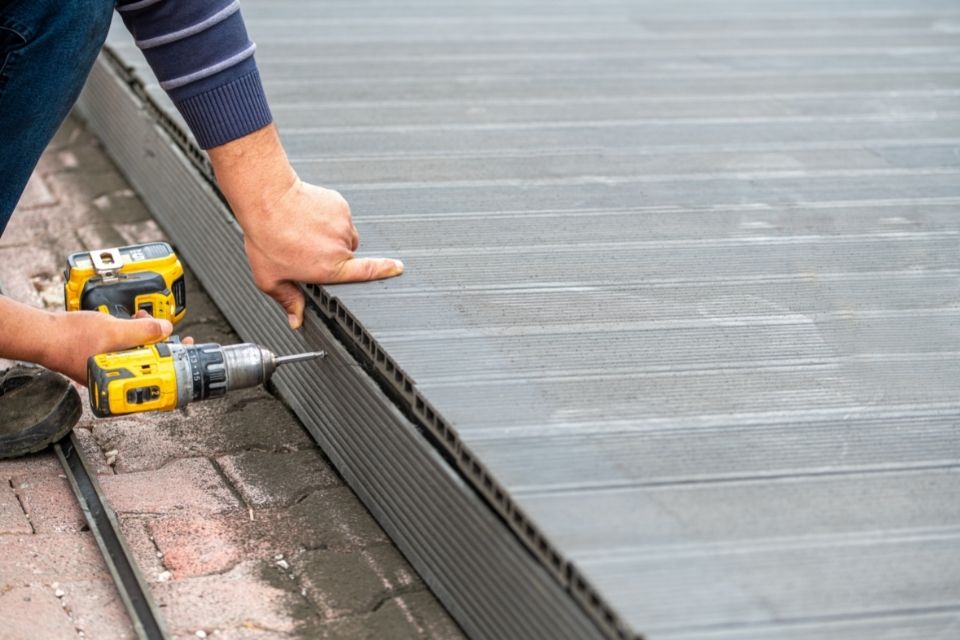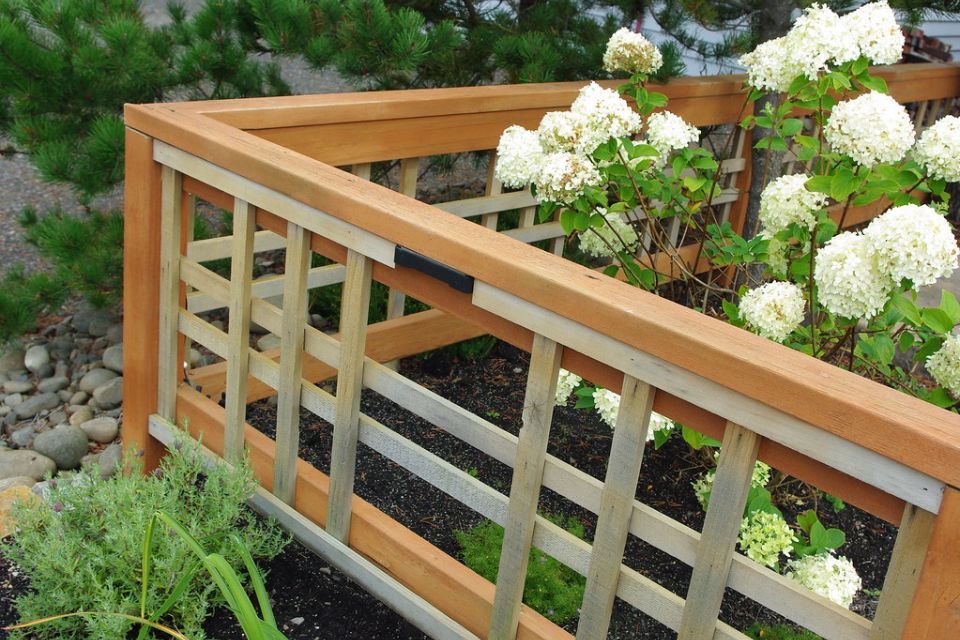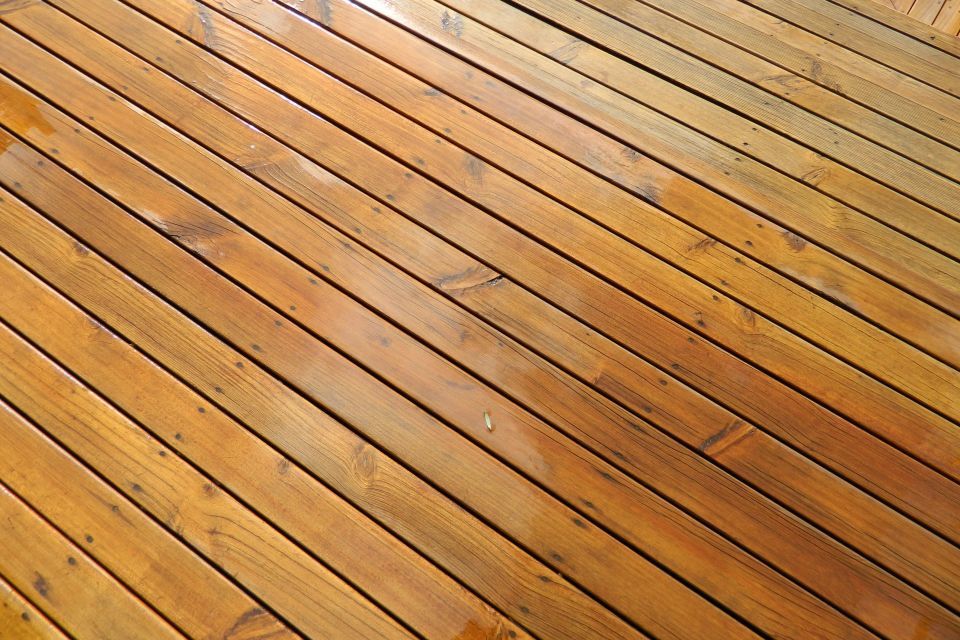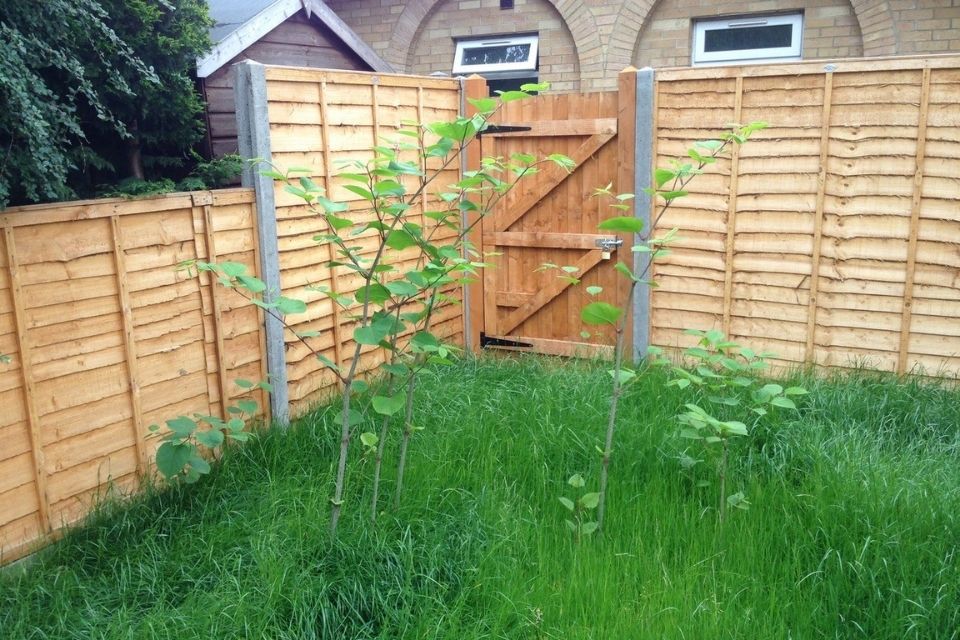How Much is Composite Decking Installation?
So, how much does a composite decking installation cost?
There are a few different options when it comes to composite decking, and the prices can vary by quite a large amount. Hollow core composite decking is the cheapest option, but it is also the weakest option. This type of decking will usually cost around £1000-£1600, depending on the size of the area.
Hollow core composite decking is the cheapest option.
If you want to choose a stronger option, you could opt for uncapped solid core composite decking. This will usually cost around £1200-£1900, depending on the size of the decking area.
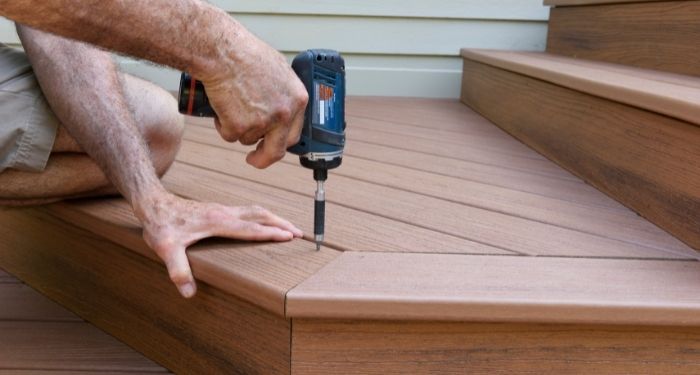
You could also choose a capped solid core composite decking. This is the strongest type of composite decking and will usually cost around £1400-£2100. The composite decking price can vary depending on the size of the area.
What can the cost depend on?
The overall prices for installing composite decking can also vary depending on where you live in the UK. Those based in the London area will usually pay more for labour than those based in the north of England and other parts of the UK.
Homeowners based in London can expect higher labour costs for the work.
Composite Decking Installation Prices
The table below highlights the costs that you can expect for various composite garden decking installations:
15m² Composite Decking Cost
| DECKING TYPE | AVERAGE COSTS |
|---|---|
| Hollow-core uncapped composite decking | £950-£1400 |
| Solid core uncapped composite decking | £1200-£1600 |
| Solid core capped composite decking | £1400-£1900 |
| PVC composite decking | £1100-£1500 |
30m² Composite Decking Cost
| DECKING TYPE | AVERAGE COSTS |
|---|---|
| Hollow-core uncapped composite decking | £1700-£2400 |
| Solid core uncapped composite decking | £2000-£2600 |
| Solid core capped composite decking | £2400-£3200 |
| PVC composite decking | £1800-£2400 |
- How Much is Composite Decking Installation?
- How Much Is Composite Decking per Square Metre?
- Additional Materials Needed for Composite Decking Installation
- What are the Additional Costs of Composite Decking Installations?
- Labour Cost to Install Composite Decking
- How Long Does It Take to Install Composite Decking?
- Types of Composite Decking
- Benefits of Composite Decking
- How Much Does Composite Decking Removal Cost?
- FAQs
How Much Is Composite Decking per Square Metre?
When it comes to the supply costs of installing composite decking, the prices can vary by quite a large amount depending on the materials you choose. There are many different styles and colours of composite decking available, and the costs of these can vary.
Uncapped hollow core composite decking will usually cost around £30-£40 per square metre, so if you’re looking for cheap composite decking, then this is your best option.
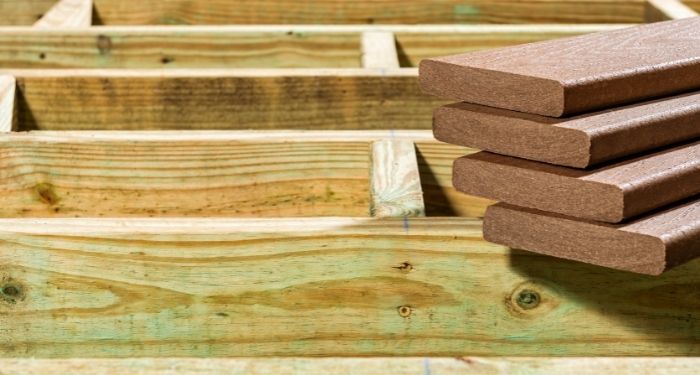
Uncapped solid core composite decking will cost around £50-£70 per square metre, and capped solid core composite decking will usually cost around £70-£90 per square metre.
PVC composite decking is usually cheaper than the solid core option, but it is more expensive than the hollow core option. This type of decking will usually cost around £35-£50 per square metre.
Additional Materials Needed for Composite Decking Installation
It's not just the decking boards themselves you need to consider when looking at supply costs. There are a variety of other materials that will be needed to complete the installation of your new decking.
Materials such as:
- A Subframe - The structural support for decking
- Decking Risers - To support the subframe
- Concrete - To secure the risers to the ground
- Fixings - Fasteners or screws to secure boards
- Spacers - To give consistent board spacing and good airflow
- Facia Boards - To give a neat & professional finish around the edges
- Weed Membrane - To stop weeds growing through the deck
What are the Additional Costs of Composite Decking Installations?
When it comes to installing composite decking, there may be additional costs that you need to consider in your budget. Some examples are set out below:
Site Preperation
Proper site preparation is essential for a successful and long-lasting composite decking installation.
Key steps for preparing the ground ready for decking may include:
- Removing garden debis and waste
- Digging up a lawn
- Removal of old decking
- Levelling the garden
- Compacting the soil with a sub-base material
- Ensuring good drainage
- Laying a weed membrane
These are jobs you could do yourself to save some money, but if you choose to get your decking installer or a gardener to carry out these jobs for you, it will cost extra in labour fees.
Labour Cost to Install Composite Decking
When installing composite decking, you will most likely need to hire a qualified team of tradespeople with experience in installing the type of decking that you choose. Depending on the company you choose, you can expect around 2-3 tradespeople to install the decking.
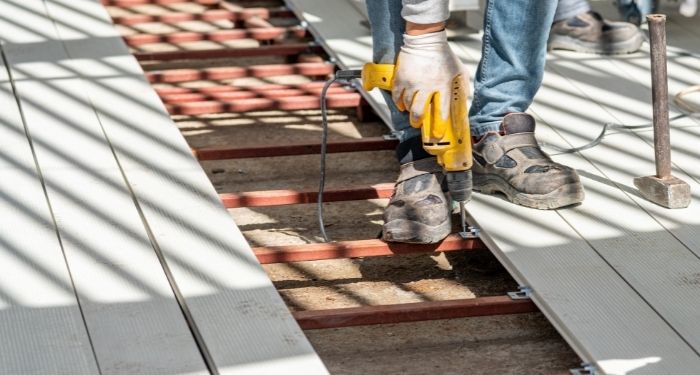
Most professional decking installers will charge around £150-£200 per day per contractor. With this in mind, you can expect to pay around £300-£600 per day for the labour costs depending on the number of contractors.
Those based in and around the London area can expect to pay more for the cost of labour than those in the north or other parts of the UK.
How Long Does It Take to Install Composite Decking?
The time it takes to install new composite decking in your garden will vary depending on the size of the area and the complexity of the installation.
If the decking is very small in size, it could likely be completed within a day. However, most composite decking installation jobs will typically take a few days to complete. The average amount of time that it takes is usually around 2-3 days.
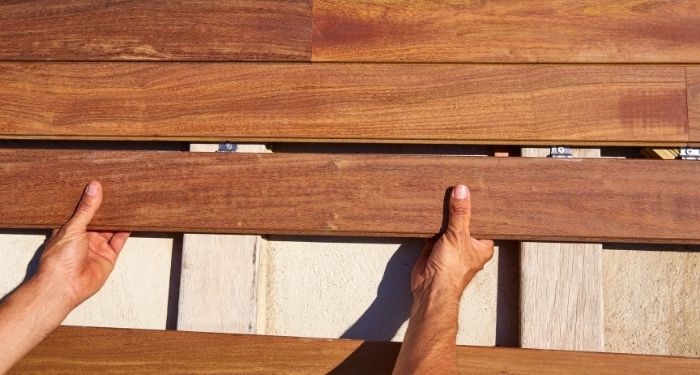
Sometimes, additional work may be needed, or some issues may arise, resulting in additional time being spent on the job. This can increase the time of the job by around a day.
Types of Composite Decking
There are various types of composite decking available, each designed to offer different levels of performance, appearance, and value. Choosing the right type depends on your budget, desired look, and how much maintenance you're willing to do. Below is a list of the most common types of composite decking, along with their pros and cons:
Hollow Core Decking
Hollow-core decking is the most affordable option in the range of composite decking materials, making it ideal for those on a tight budget who still want the benefits of composite decking.
These boards are designed with a hollow interior, which reduces material usage and weight, making them significantly lighter and easier to handle during installation compared to solid boards.
Being 'uncapped' means that these boards do not have an additional protective outer layer, which helps keep costs down but also means they may be more susceptible to wear, fading, and moisture penetration over time.
This type of decking is best suited for low-traffic areas or temporary installations where budget constraints are a priority.
Pros
- Cheapest composite decking material
- Available in a large number of styles and colours
- Resistant to mould, mildew and algae
Cons
- Not as strong as solid core composite decking
- Composite designs and colours are permanent
- More expensive than timber options
Solid Core Composite Decking
Solid core decking is at the premium end of composite decking options. It comes with a higher price tag but offers superior durability and strength. Unlike hollow-core boards, solid core decking is made entirely from dense composite material which provides a robust and sturdy surface that can withstand heavy foot traffic, impacts, and harsh weather conditions.

This makes it an excellent choice for homeowners wanting a long-lasting and low-maintenance decking solution. While the upfront cost is higher, many find the investment is well worth it due to the extended lifespan and the enhanced performance solid core decking provides compared to other types.
Pros
- Very strong and durable
- Requires almost no maintenance
- Available in a wide range of colours, styles and designs
- Resistant to mould, mildew and algae
Cons
- Composite designs and colours are permanent
- The most expensive composite decking material
PVC Decking
PVC decking is considered a mid-range option, offering a great balance between durability, aesthetics, and maintenance requirements. Made entirely from synthetic materials, PVC decking is highly resistant to moisture, mould and insect damage. This makes it an excellent choice for areas that are exposed to wet or humid conditions, such as pool surrounds or coastal gardens.
It comes in a wide variety of colours and styles, allowing homeowners to customise their deck to suit their taste. PVC decking also requires minimal maintenance, unlike traditional wood or even some composite boards, as it does not require regular sealing, staining, or painting.
Pros
- Requires almost no maintenance
- Clean, shiny finish
- It comes in a wide range of colours and designs
- Resistant to mould, mildew and algae
Cons
- It can look a little bit cheap and flimsy
- Show scuffs and scratches quite easily
- Composite designs and colours are permanent
Benefits of Composite Decking
There are several benefits to installing composite decking in your garden. Below is a list of the main advantages of this type of work:
Low Maintenance
When compared to timber decking, composite decking is very low maintenance. All it requires is a simple hose down to keep it clean and free from dirt and debris. Timber decking, however, requires a lot more maintenance.
Durability
Composite decking is extremely desirable due to its durability. It can withstand bad weather and constant use. The material of composite decking is extremely hardwearing and repels rot, mould, algae, and scum.
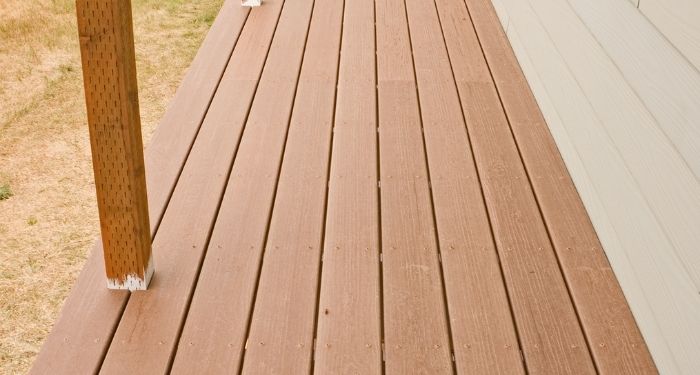
Aesthetics
Composite decking is very aesthetically pleasing. It comes in a very wide range of styles, colours, and designs. This means that you can choose your composite decking style depending on the style of your garden to make it very aesthetically pleasing.
Sustainable
Composite materials are man0made, and so they are very sustainable. The materials are made up of plastic and wood combinations. Old recycled materials can also be used to create composite decking, and the materials can be recycled and used again.
How Much Does Composite Decking Removal Cost?
If you have moved into a home with composite decking and you no longer want it, or if you are planning on landscaping your garden and changing its appearance, you may need to remove your composite decking.
It is easier to remove your composite decking than it is to install composite decking. This type of work can be done as a DIY project in most cases; however, it can require a lot of labour. Therefore, many homeowners choose to hire an external company to come in and remove the decking.
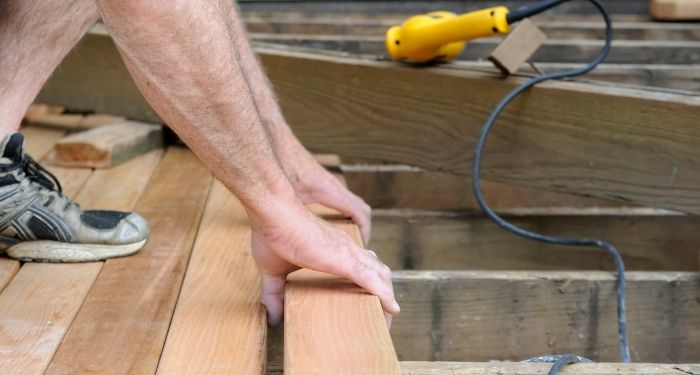
It will most often take around half a day to remove composite decking, depending on the size. It should take no more than a day to complete. You can expect to pay around £100-£200 to have a tradesperson come and remove your composite decking for you.
FAQs
Q: What is composite decking made of?
A: Composite decking is typically made of 55% wood fibres made from reclaimed material and around 45% polyethylene, which is recycled plastic bottles. Some manufacturers will use different materials. However, you can expect it to be a 50/50 mix of mostly recycled plastic materials and wood.
Q: How do you clean composite decking?
A: Composite decking should be cleaned thoroughly a few times each year using soap, a hose, and a cloth or scrubbing brush. If the decking has any staining, these should be cleaned as quickly as possible. You should avoid using bleach as this will change the colour of the decking surface.
Q: What is capped composite decking?
A: Composite decking is usually referred to as either capped decking or uncapped decking. Capping refers to a plastic coating that is added to the composite decking boards and acts as extra protection against weather and other outdoor elements. The protective coating is bonded to the core during the manufacturing stage and protects those core materials against damp, mould, and UV light.
Q: How long will composite decking last?
A: Most composite decking products will come with a 10-year warranty, which means that the materials are expected to last at least ten years. This is provided that you maintain your decking properly and are located in an area with stable weather conditions.
Q: Can you lay composite decking on grass?
A: You can lay composite decking on top of grass. However, the surface must be completely level and flat enough to support the new decking structure.

